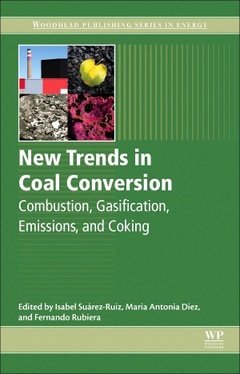Description
New Trends in Coal Conversion
Combustion, Gasification, Emissions, and Coking
Coordinators: Suarez-Ruiz Isabel, Rubiera Fernando, Antonia Diez Maria
Language: English
Subject for New Trends in Coal Conversion:
Keywords
<; P>; Coal combustion; carbonization; gasification; clean coal; coking; CO2 capture; coal blends; co-firing; biocarbons; trace elements<; /P>; <; P>; <; /P>
542 p. · 15x22.8 cm · Paperback
Description
/li>Contents
/li>Readership
/li>Biography
/li>Comment
/li>
New Trends in Coal Conversion: Combustion, Gasification, Emissions, and Coking covers the latest advancements in coal utilization, including coal conversion processes and mitigation of environmental impacts, providing an up-to-date source of information for a cleaner and more environmentally friendly use of coal, with a particular emphasis on the two biggest users of coal?utilities and the steel industry. Coverage includes recent advances in combustion co-firing, gasification, and on the minimization of trace element and CO2 emissions that is ideal for plant engineers, researchers, and quality control engineers in electric utilities and steelmaking.
Other sections cover new advances in clean coal technologies for the steel industry, technological advances in conventional by-products, the heat-recovery/non-recovering cokemaking process, and the increasing use of low-quality coals in coking blends. Readers will learn how to make more effective use of coal resources, deliver higher productivity, save energy and reduce the environmental impact of their coal utilization.
1. Coal 2. Coal Combustion: New Trends and Co-firing 3. Coal Gasification: Advances 4. Emissions from Coal Combustion and Gasification: Trace Elements 5. Current Status of CO2 Capture from Coal Utilities 6. Coal Quality for the Iron and Steel Industry 7. Metallurgical Coke Production and Coal Chemicals Recovery 8. Metallurgical Coke Quality for Blast Furnace 9. Cokemaking and the Environment 10. New Perspectives: Future Coal Markets
researchers in coal/clean coal technology, plant engineers in coal-fired utilities and power plants and steel industries, quality control engineers working with coal and coal blends
Fernando Rubiera is a scientific researcher at the INCAR-CSIC where he currently acts as the Director. He is also vicepresident of the Spanish Platform of CO2, where he is in charge of the groups of CO2 Capture and CO2 Utilisation. Between 1992 and 1995 he was seconded to British Coal (TSRE, Bretby) and to the University of Nottingham to conduct investigations into the optimisation of fine coal cleaning processes. He is an expert on fuel science and technology and his research lines are also directed towards the valorisation of biomass for the production of energy, including co-combustion and co-gasification with coal. Likewise, his research activities embrace the preparation, modification and textural characterisation of carbon materials with a high specificity, in terms of porous development and surface chemistry, for different applications mainly on CO2 capture from postcombustion flue gases. He has been the PI of 6 International (4 European) funded projects and several national projects, raising more than 4 M€. He is member of the Editorial Board of Biomass & Bioenergy, and the Editorial Advisory Board of Greenhouse Gases: Science and Technology
María Antonia Diez is a research scientist of the Spanish National R
- Provides the current state-of-the-art and ongoing activities within coal conversion processes, with an emphasis on emerging technologies for the reduction of CO2 and trace elements
- Discusses innovations in cokemaking for improved efficiency, energy savings and reduced environmental impact
- Include case studies and examples throughout the book
These books may interest you

Clean Coal Engineering Technology 111.49 €



